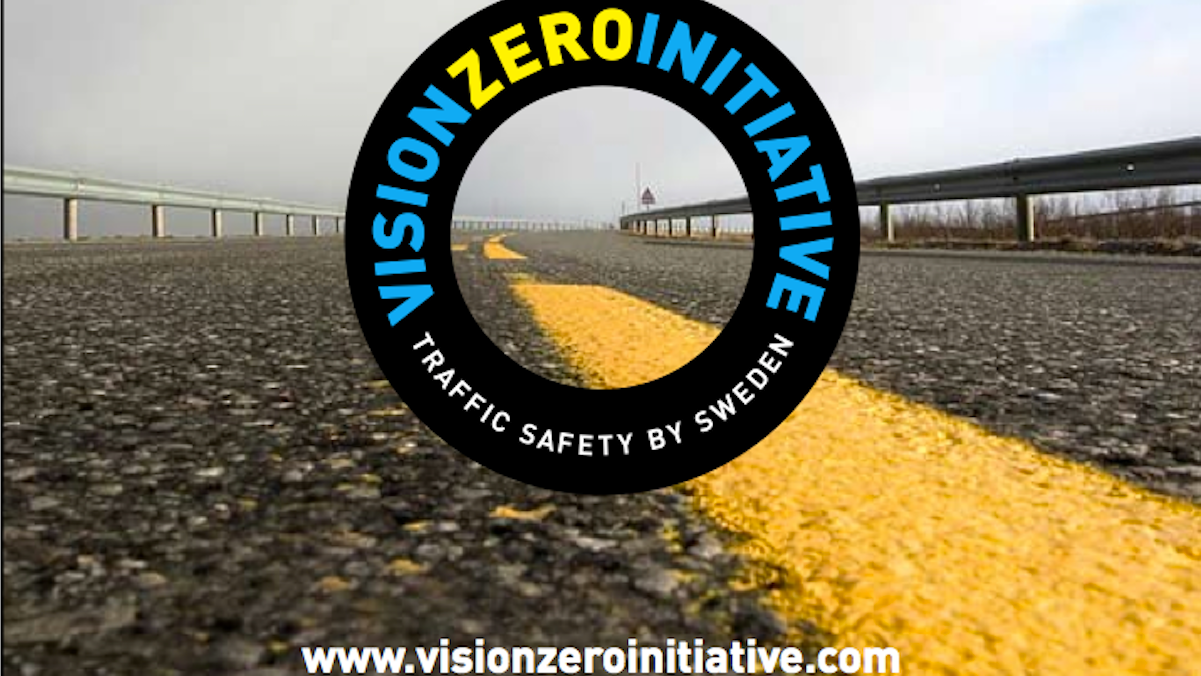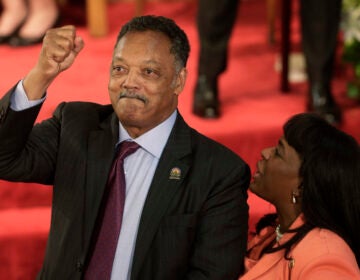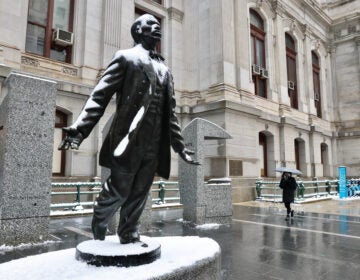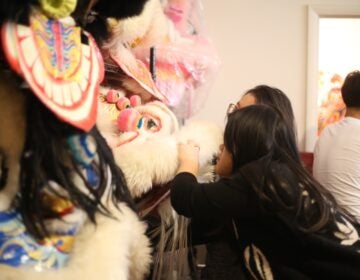Ask the mayoral candidates: How will you implement the ‘Vision Zero’ initiative?

The Vision Zero Initiative has been adopted in New York City and San Francisco. The Bicycle Coalition hopes it comes to Philly soon. (Image courtesy of Vision Zero's website)
As part of a regular series leading up to Philadelphia’s May 19 mayoral primaries, NewsWorks will pose various questions to the declared candidates. Do you have a question? Email it to bhickey@whyy.org.
Question
According to a report released by the Bicycle Coalition of Greater Philadelphia, “35 percent of 94 people killed in traffic in 2013 (about one death every 90 hours) in Philadelphia were pedestrians.”
The coalition, which will host a mayoral forum Thursday night (6-8 p.m., Friends Center, 1501 Cherry St.), believes “it is imperative that the City embark on an effort to implement a targeted program to address dangerous locations in the cities with the goal of reducing all traffic injuries and fatalities by 50 percent by 2020 — with the eventual goal of zero deaths, also known as a ‘Vision Zero’ policy.”
Vision Zero has been embraced by several American cities, including New York City and San Francisco.
If elected mayor, what steps — if any — would you take to see Vision Zero become a reality in Philadelphia?
The candidates’ answers (in alphabetical order)
Lynne Abraham: I absolutely agree with Vision Zero’s mission statement that “no loss of life is acceptable.” I will make it a priority under my administration to implement a Vision Zero policy in Philadelphia.
This will make our streets safer and more user-friendly for pedestrians, bicyclists, and motorists as well. The need for Vision Zero is even more urgent as we roll out the bike share program.
To make Vision Zero a reality in Philadelphia, I will seek guidance and best practices from cities that have already implemented Vision Zero, such as New York, San Francisco, Seattle and Portland, Oregon.
I will engage representatives from the city, the Bicycling Coalition of Greater Philadelphia, and other interested organizations to help design a workable Vision Zero policy and implementation timeline.
Finally, in conjunction with implementation of Vision Zero, I will coordinate with the Philadelphia Bicycle Advocacy Board to explore the need for more bike lanes and bicycle safety regulations.
Nelson Diaz: I agree wholeheartedly with the goals of Vision Zero. As an avid biker and regular mass transit commuter, I’ve personally experienced the issues that make our streets much less safe than they can be.
It is problematic that the City Council unanimously usurped the mayor’s traditional power to make major changes to the streetscape of Philadelphia, a move that was in direct response to Mayor Nutter’s attempt to make our city more friendly to transit alternatives.
That’s a vote I’m sure one of my opponents wishes he could have back now that he’s running for mayor. Many of the most consequential changes that we could make as a city require us to repeal this bad — and unprecedented — law.
There is a limited amount of street space in our city, and more of it needs to be dedicated to pedestrians, bicyclists and mass transit. The mayor, who can take a holistic view of our entire transportation network and is less susceptible to NIMBY pressures, should be in charge of setting priorities citywide and implementing them.
We should be actively encouraging alternative options, not only to reduce our reliance on the automobile but also as an equity issue; as recent studies demonstrated, many of those without cars are our poorest citizens.
We can make relatively low-cost investments in things like community parklets, pedestrian islands, better traffic synchronization to avoid bottlenecks and discourage speeding, and traffic calming initiatives that will benefit local communities and the city as a whole.
I also support the expanded use of traffic cameras as a traffic-control device. They’ve often been used primarily as a revenue generator, but I think that traffic control should always take precedence over revenue with cameras. All of these changes should be done in partnership with local groups to make better use of our limited municipal resources. Many of my individual policy proposals in this campaign also involve a simple equation: Neighborhood beautification, whether it’s creating parklets or seizing abandoned or vacant lots, is good for everyone, particularly pedestrians.
Our city has most of the resources we need to be a new-economy hub beyond just ‘eds and meds,’ but we’ve never put them together in a coherent and comprehensive way to make that possibility a reality. Aggressively tackling dangerous streets and looking to make them dramatically safer for pedestrians and motorists alike should be a key component of that plan.
Jim Kenney: As Mayor, I will take a multi-faceted approach to implementing Vision Zero. This includes continuing and expanding on the work of the Nutter administration by increasing the number and safeness of bike lanes throughout our city.
I will form a Vision Zero task force made up of stakeholders from local and state transportation agencies, public safety agencies, advocacy groups, local businesses and community members.
This task force will be asked to create a ‘Vision Zero Action Plan’ for Philadelphia so that we can ensure that no more lives are lost needlessly to a preventable traffic accident.
Melissa Murray Bailey (R): I have made it clear from the beginning that I have one goal: make Philadelphia stronger and better for everyone.
One of the best parts about living in the city for my family is being able to walk … everywhere. Additionally, my husband is an avid biker. An interconnected city is essential for the city to thrive, and we need to make it easy and safe for people to get around whether they have a car or not. Mass transit needs to be easy, affordable and, most importantly, predictable. If we can do that, then we will have less cars on the streets, and more people will be able to get where they are going on time and safely.
Of course I want to reduce the number of traffic-related deaths and injuries to zero percent. When my husband goes out for a ride, I don’t want to have to worry about his safety. There are some ‘just do its’ that we should implement right away, like adjusting the cross walk timing so that pedestrians — especially those with precious cargo in their strollers — have the opportunity to get across the street before the light turns green going in the other direction. The turn lanes should also be eliminated on streets where there is a bike lane so that the intention of the lanes can be realized.
As a runner myself, I see the need for more pedestrian-friendly spaces in the city. The High Line in New York City is a great example of the city turning unused space into a beautiful public space away from the noise and danger of the city streets. The plan for a similar park along the Reading Duct would provide safe space for pedestrians and cyclists while also connecting several neighborhoods north of Center City.
Doug Oliver: As mayor, I support the Bicycle Coalition’s Vision Zero plan, which defines the necessary steps to eliminate traffic accidents involving pedestrians and bikers.
I am fully focused on implementing initiatives to protect the health and safety of all Philadelphians.
Your goal should be zero. We used to talk about this at Philadelphia Gas Works all the time with preventable motor vehicle accidents, and our board would always be saying “Why do we have a goal of six? Why isn’t it zero?” And there’s always a debate about whether the goal should be a realistic target or the ideal.
I think it’s required that you have a Vision Zero policy because it’s hard enough to get people thinking about these things to have a mayor come in and be thinking about this in an underachieving way.
Milton Street: I would support something like that, especially for bicyclists. We should have more people coming to work on bicycles. It would reduce the number of cars coming into the city each day, promotes good health and gives people a chance to enjoy the outdoors.
Tony Williams: Improving mobility is about connecting neighbors and neighborhoods. My vision of One Philadelphia is a city of distinctive, yet connected, neighborhoods that have the same access to great schools, thriving businesses, and clean, safe streets.
Over the last four years, pedestrian deaths have increased by 16 percent, from North Philadelphia to Northeast Philadelphia.
I embrace Vision Zero, and as mayor I will convene a Vision Zero Task Force to improve policy coordination across city government, and develop a plan to reduce traffic-related fatalities and injuries by 50 percent by 2020.
WHYY is your source for fact-based, in-depth journalism and information. As a nonprofit organization, we rely on financial support from readers like you. Please give today.




